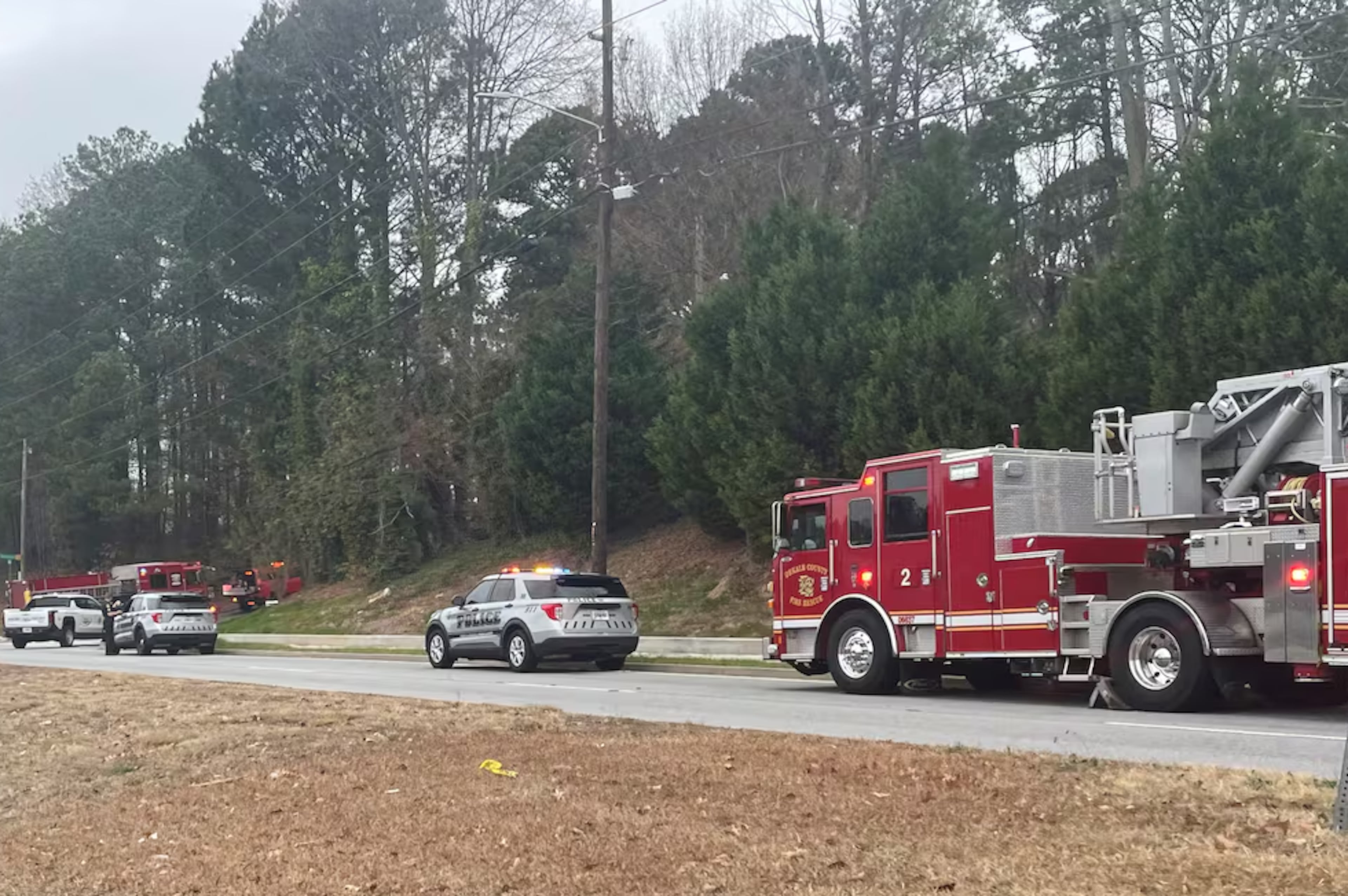BioLab facing lawsuits for damages after Conyers chemical plant fire

As the massive smoke plume from Sunday’s chemical plant fire in Conyers continues to hover over Rockdale County and surrounding communities, residents have filed the first lawsuits seeking damages for the more than 90,000 people affected.
At least six complaints were lodged Monday against BioLab, the company that owns the factory, and its Lawrenceville-based parent company, KIK Consumer Products. The lawsuits, filed in Gwinnett County State Court, Rockdale County Superior Court and the federal district court in Atlanta, focus on health and property-related issues tied to emergency evacuation and shelter-in-place orders.
“What’s especially egregious is that the defendants have been here before — having exposed this community in a similar fashion over the past 20 years,” said Daniel Flynn, an attorney representing Rockdale residents Fannie and Albert Tartt in a federal complaint. “The defendants, not the community, should bear the costs of the defendants’ conduct.”
Representatives for BioLab and KIK did not immediately comment on the lawsuits. In a written statement on Monday, KIK said the community’s safety is its top priority.
Rockdale County, with a population of more than 90,000, was under a shelter-in-place order after the fire broke out Sunday, but authorities lifted the order Monday evening. But on Tuesday, Rockdale residents again were advised to shelter in place if the plume moved into their area, and authorities continued to test air quality across metro Atlanta
About 17,000 Rockdale County residents were ordered to evacuate Sunday. Continued emissions from the BioLab plant led to school closures and event disruptions across the metro area.
Chris Stewart, another attorney for the Tartts, said the extent of the damage and health concerns is largely unknown and will continue to be monitored. He said the incident is not an accident, citing previous fires and chemical releases at the Conyers plant.
“The air in Georgia has been destroyed by the negligence of this company,” Stewart said during a news conference Tuesday. “We’re tired of turning the cheek.”
BioLab, which makes pool and spa treatment products, has had a series of fires and chemical releases at its facilities in Georgia and elsewhere, an Atlanta Journal-Constitution review of state and federal records shows. Sunday’s fire is at least the fourth significant fire or chemical release at the Conyers plant since 2004.
Authorities responded to incidents at the Conyers plant in 2020, 2016 and 2004, when roads were closed, businesses were evacuated and residents were ordered to shelter in place.
The U.S. Chemical Safety and Hazard Investigation Board investigated the 2020 incident, which a BioLab spokesman attributed to water exposure inside the facility.
The 2016 incident caused smoke from a swimming pool chemical, according to a Georgia Environmental Protection Division complaint report.
The BioLab warehouse where a fire broke out in 2004 contained about 12.5 million pounds of pool chemicals and oxidizers. People sought shelter at House Elementary and Heritage High School, according to an EPA pollution report.
A class action over the 2004 fire settled for $7 million, reports show. The money from BioLab’s then-parent company, Chemtura, was temporarily tied up in its Chapter 11 bankruptcy. The deal included more than $11,000 for the Rockdale Firefighters Charity Fund.
Former Gov. Roy Barnes, another attorney for the Tartts, said Sunday’s fire never should have happened.
“Citizens trust that when companies are handling potentially toxic and dangerous chemicals, they take the utmost care to ensure that people don’t get hurt,” Barnes said. “The people of Conyers trusted the defendants to keep them safe, and the defendants abused that trust.”
Claims against BioLab and KIK include negligence, nuisance and trespass. Each complaint filed Monday seeks to become a class action on behalf of the more than 90,000 people affected. Requested relief includes damages for property devaluation and business losses.
In a separate lawsuit filed in Gwinnett County State Court, Conyers residents Emanuel and Eleanor Dobbins said toxic chemicals from BioLab’s plant infiltrated their home and possessions, making it difficult for them to breathe. They said the chemicals irritated residents’ eyes, sinuses, skin and throats, causing widespread apprehension, distress and fear.
“Plaintiffs try to avoid BioLab’s smoke and other pollutants, but they cannot,” the Dobbins complaint states.
Another lawsuit filed in Gwinnett County State Court by Conyers residents Michael Lynch and Scott Hansen — together with the companies Beta Electric and Digital Thunderdome, which have offices in Conyers and Lithonia — said BioLab knew its failure to properly store chemicals and manage operations could cause harm.
In a separate complaint filed in the U.S. District Court for the Northern District of Georgia, Conyers resident Tonya Long alleged that “incredibly toxic” chemicals that can cause severe, life-changing injuries billowed throughout Rockdale County.
“Despite catastrophic failure after catastrophic failure, defendants have stubbornly refused to do the bare minimum, or take proper precautions with their volatile and hazardous chemicals to prevent another catastrophic toxic chemical reaction, explosion and release,” Long’s lawsuit states.
In a complaint filed in Rockdale County Superior Court, five Rockdale residents alleged that the chemical emissions from BioLab’s Conyers plant harmed people and their pets; damaged houses, vehicles, lawns and gardens; and contaminated surface water and wells. They said some evacuated residents have had to pay for accommodations and still are unable to return to their homes.




